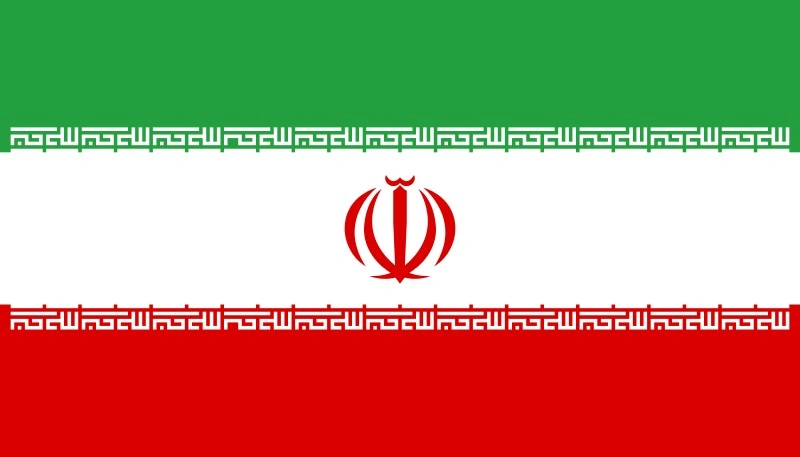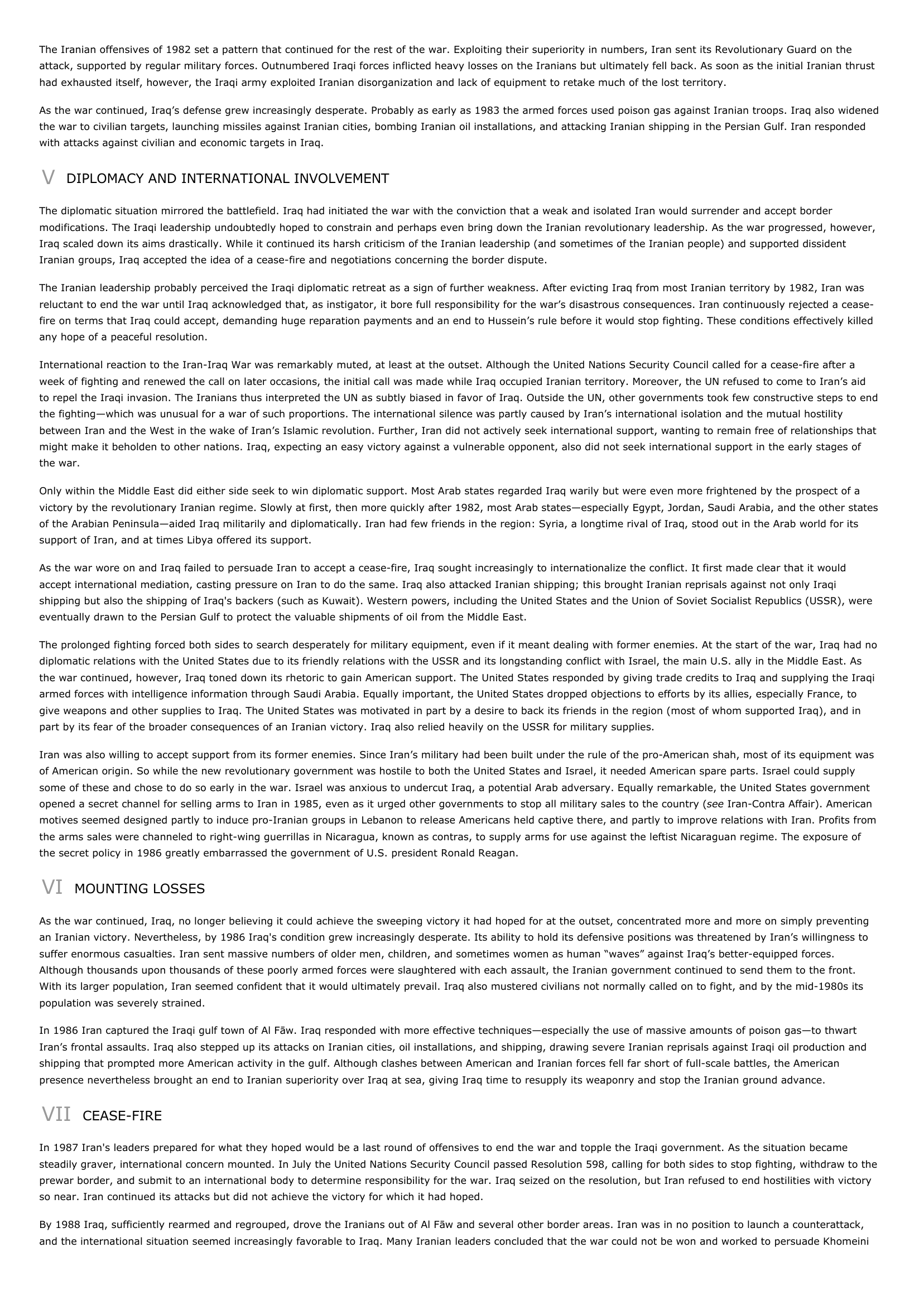Iran-Iraq War - History.
Publié le 02/05/2013

Extrait du document


«
The Iranian offensives of 1982 set a pattern that continued for the rest of the war.
Exploiting their superiority in numbers, Iran sent its Revolutionary Guard on theattack, supported by regular military forces.
Outnumbered Iraqi forces inflicted heavy losses on the Iranians but ultimately fell back.
As soon as the initial Iranian thrusthad exhausted itself, however, the Iraqi army exploited Iranian disorganization and lack of equipment to retake much of the lost territory.
As the war continued, Iraq’s defense grew increasingly desperate.
Probably as early as 1983 the armed forces used poison gas against Iranian troops.
Iraq also widenedthe war to civilian targets, launching missiles against Iranian cities, bombing Iranian oil installations, and attacking Iranian shipping in the Persian Gulf.
Iran respondedwith attacks against civilian and economic targets in Iraq.
V DIPLOMACY AND INTERNATIONAL INVOLVEMENT
The diplomatic situation mirrored the battlefield.
Iraq had initiated the war with the conviction that a weak and isolated Iran would surrender and accept bordermodifications.
The Iraqi leadership undoubtedly hoped to constrain and perhaps even bring down the Iranian revolutionary leadership.
As the war progressed, however,Iraq scaled down its aims drastically.
While it continued its harsh criticism of the Iranian leadership (and sometimes of the Iranian people) and supported dissidentIranian groups, Iraq accepted the idea of a cease-fire and negotiations concerning the border dispute.
The Iranian leadership probably perceived the Iraqi diplomatic retreat as a sign of further weakness.
After evicting Iraq from most Iranian territory by 1982, Iran wasreluctant to end the war until Iraq acknowledged that, as instigator, it bore full responsibility for the war’s disastrous consequences.
Iran continuously rejected a cease-fire on terms that Iraq could accept, demanding huge reparation payments and an end to Hussein’s rule before it would stop fighting.
These conditions effectively killedany hope of a peaceful resolution.
International reaction to the Iran-Iraq War was remarkably muted, at least at the outset.
Although the United Nations Security Council called for a cease-fire after aweek of fighting and renewed the call on later occasions, the initial call was made while Iraq occupied Iranian territory.
Moreover, the UN refused to come to Iran’s aidto repel the Iraqi invasion.
The Iranians thus interpreted the UN as subtly biased in favor of Iraq.
Outside the UN, other governments took few constructive steps to endthe fighting—which was unusual for a war of such proportions.
The international silence was partly caused by Iran’s international isolation and the mutual hostilitybetween Iran and the West in the wake of Iran’s Islamic revolution.
Further, Iran did not actively seek international support, wanting to remain free of relationships thatmight make it beholden to other nations.
Iraq, expecting an easy victory against a vulnerable opponent, also did not seek international support in the early stages ofthe war.
Only within the Middle East did either side seek to win diplomatic support.
Most Arab states regarded Iraq warily but were even more frightened by the prospect of avictory by the revolutionary Iranian regime.
Slowly at first, then more quickly after 1982, most Arab states—especially Egypt, Jordan, Saudi Arabia, and the other statesof the Arabian Peninsula—aided Iraq militarily and diplomatically.
Iran had few friends in the region: Syria, a longtime rival of Iraq, stood out in the Arab world for itssupport of Iran, and at times Libya offered its support.
As the war wore on and Iraq failed to persuade Iran to accept a cease-fire, Iraq sought increasingly to internationalize the conflict.
It first made clear that it wouldaccept international mediation, casting pressure on Iran to do the same.
Iraq also attacked Iranian shipping; this brought Iranian reprisals against not only Iraqishipping but also the shipping of Iraq's backers (such as Kuwait).
Western powers, including the United States and the Union of Soviet Socialist Republics (USSR), wereeventually drawn to the Persian Gulf to protect the valuable shipments of oil from the Middle East.
The prolonged fighting forced both sides to search desperately for military equipment, even if it meant dealing with former enemies.
At the start of the war, Iraq had nodiplomatic relations with the United States due to its friendly relations with the USSR and its longstanding conflict with Israel, the main U.S.
ally in the Middle East.
Asthe war continued, however, Iraq toned down its rhetoric to gain American support.
The United States responded by giving trade credits to Iraq and supplying the Iraqiarmed forces with intelligence information through Saudi Arabia.
Equally important, the United States dropped objections to efforts by its allies, especially France, togive weapons and other supplies to Iraq.
The United States was motivated in part by a desire to back its friends in the region (most of whom supported Iraq), and inpart by its fear of the broader consequences of an Iranian victory.
Iraq also relied heavily on the USSR for military supplies.
Iran was also willing to accept support from its former enemies.
Since Iran’s military had been built under the rule of the pro-American shah, most of its equipment wasof American origin.
So while the new revolutionary government was hostile to both the United States and Israel, it needed American spare parts.
Israel could supplysome of these and chose to do so early in the war.
Israel was anxious to undercut Iraq, a potential Arab adversary.
Equally remarkable, the United States governmentopened a secret channel for selling arms to Iran in 1985, even as it urged other governments to stop all military sales to the country ( see Iran-Contra Affair).
American motives seemed designed partly to induce pro-Iranian groups in Lebanon to release Americans held captive there, and partly to improve relations with Iran.
Profits fromthe arms sales were channeled to right-wing guerrillas in Nicaragua, known as contras, to supply arms for use against the leftist Nicaraguan regime.
The exposure ofthe secret policy in 1986 greatly embarrassed the government of U.S.
president Ronald Reagan.
VI MOUNTING LOSSES
As the war continued, Iraq, no longer believing it could achieve the sweeping victory it had hoped for at the outset, concentrated more and more on simply preventingan Iranian victory.
Nevertheless, by 1986 Iraq's condition grew increasingly desperate.
Its ability to hold its defensive positions was threatened by Iran’s willingness tosuffer enormous casualties.
Iran sent massive numbers of older men, children, and sometimes women as human “waves” against Iraq’s better-equipped forces.Although thousands upon thousands of these poorly armed forces were slaughtered with each assault, the Iranian government continued to send them to the front.With its larger population, Iran seemed confident that it would ultimately prevail.
Iraq also mustered civilians not normally called on to fight, and by the mid-1980s itspopulation was severely strained.
In 1986 Iran captured the Iraqi gulf town of Al Fāw.
Iraq responded with more effective techniques—especially the use of massive amounts of poison gas—to thwartIran’s frontal assaults.
Iraq also stepped up its attacks on Iranian cities, oil installations, and shipping, drawing severe Iranian reprisals against Iraqi oil production andshipping that prompted more American activity in the gulf.
Although clashes between American and Iranian forces fell far short of full-scale battles, the Americanpresence nevertheless brought an end to Iranian superiority over Iraq at sea, giving Iraq time to resupply its weaponry and stop the Iranian ground advance.
VII CEASE-FIRE
In 1987 Iran's leaders prepared for what they hoped would be a last round of offensives to end the war and topple the Iraqi government.
As the situation becamesteadily graver, international concern mounted.
In July the United Nations Security Council passed Resolution 598, calling for both sides to stop fighting, withdraw to theprewar border, and submit to an international body to determine responsibility for the war.
Iraq seized on the resolution, but Iran refused to end hostilities with victoryso near.
Iran continued its attacks but did not achieve the victory for which it had hoped.
By 1988 Iraq, sufficiently rearmed and regrouped, drove the Iranians out of Al F āw and several other border areas.
Iran was in no position to launch a counterattack,and the international situation seemed increasingly favorable to Iraq.
Many Iranian leaders concluded that the war could not be won and worked to persuade Khomeini.
»
↓↓↓ APERÇU DU DOCUMENT ↓↓↓
Liens utiles
- USA - Iraq War - History.
- U.S.-Iraq War - U.S. History. I INTRODUCTION U.S.-Iraq War, military action begun in
- Boer War - history.
- Algerian War of Independence - history.
- War of 1812 - History.




